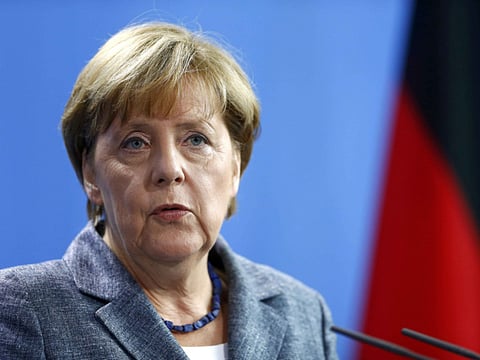Merkel steers a cautious course
Even before the mood of public spiritedness begins to sour over hosting refugees, the chancellor is trying to lower expectations

She is perhaps the most powerful woman in the world, but that does not mean she cannot seem to change her mind. Just 10 days ago, German Chancellor Angela Merkel unexpectedly declared an exception to European rules, opening Germany’s borders to trainfuls of people — most of them refugees from the war in Syria — whose passage had until then been blocked by hostile Hungarian authorities. Then, last Sunday, she announced controls along the border with Austria intended to better regulate the influx of those refugees. Does the chancellor know what she is doing?
Her initial embrace of the refugees’ cause chimed with a public mood that also moved ZDF, the public broadcaster in Germany, to air a prime-time charity appeal show. It was a well-intentioned gesture, like the ones that followed the 2004 tsunami that killed perhaps 250,000 people in south Asia.
But behind this display of generosity lies a misunderstanding about what welcoming refugees really entails. One-time donations of money and a few worn-out clothes will not be enough.
The consequences of absorbing as many as one million are only just becoming clear. Consider just one of them. As the summer holidays ended, many schools found their gyms given over to refugees. That is logical enough; few other buildings have the bathroom facilities needed to host large numbers of people. But it will also be disruptive. Aside from school classes, these gyms are home to sports clubs for young and old. Germans might be willing to greet arriving refugees with sweets, but will they be willing to give up their afternoon and evening pursuits to put a roof over their head for more than a few weeks? I doubt it.
Merkel doubts it too. Yet, she is in a good mood. Unlike the crisis over Greece, this one seems to fit her talents and tactics almost perfectly. It is set to show her in the most favourable light.
The chancellor is said to think things through from their end point backwards. Having anticipated that no one was likely to stop those refugees on their trip to Germany, she took the initiative and invited them in. That early generosity raised the moral pressure on other big European Union (EU) member states such as France and the United Kingdom. It also made her reintroduction of border controls week before last look like pragmatism rather than panic or prejudice. And it all may prod the EU in the direction of a quota system that distributes refugees across the EU, as Merkel has long desired.
Moreover, Merkel calmed Germans in her distinctive way, by cutting a giant, complex problem into lots of tiny ones. Should public regulation of the height of staircase railings be set aside to quickly muster rooms for refugees in former army barracks? That is a problem she can solve — and will. And it is her low key, hands-on approach that gives Germans confidence in the chancellor. Her personal ratings are close to a record high.
Yet, she will need to manage expectations meticulously. In Europe and — to a lesser extent — in Germany, the situation is getting out of control. This is why ordinary people are rushing to help. But if the strains continue to show, Germans will soon hold the authorities responsible. They will begin with local government, perhaps, but their discontent will soon reach all the way up to the chancellor. Even before the mood of public spiritedness begins to sour, Merkel is already trying to lower expectations, as she has done before.
Horst Seehofer, the Bavarian Prime Minister, did not intend to help the chancellor when he argued last week for limits on the number of new arrivals. But paradoxically, that is exactly what he did. By opening fire, Seehofer became the first senior politician to suggest that German generosity must have limits. That gave the chancellor cover to take the same line.
Merkel is having a better crisis than she did earlier this year, when Greece threatened to spiral out of the euro for the second time in three years. After at first allowing her finance minister to talk tough, she ducked off a final confrontation with Francois Hollande, the French President, who staunchly opposed a Greek exit. In the end, Merkel did not secure the outcome she wanted. But that did not stop the rest of Europe from resenting her for trying.
This time it is the other way round. By standing out morally and by footing a large part of the bill, Merkel wins praise. And she also wins the right to set Germany and Europe on her favoured course.
— Financial Times
Nikolaus Blome is a German journalist and a former editorial board member at Bild-Zeitung und Spiegel.


